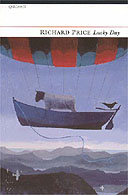
Lucky Day
by Richard Price
128pp, Carcanet, £8.95
"It's good to have the, / to have the technology", writes Richard Price in his poem "Softened, bright". The deliberate accident of that little stutter - the skip of a CD? Or a human stammer? - undermines the apparently banal and confident statement. It's a deftly stumbling example of Price's frequent use of the hesitancies and errors of human speech: elsewhere, the slips include "margin of horror", which could sometimes serve as a description of the technique itself. The words in his lyric poems are, most of the time, pop-song simple. Their weight comes in the spaces, in what is unsaid and half-said and mis-said. Price's language conveys emotion in its smallest tones and failures, as much as in the tiny, hope-against-hope rise and fall of his subtle cadences. Price gives us telling inarticulacies.
In "Hand Held", a sequence about a child with Angelman syndrome ("sufferers have severe learning difficulties, problems walking and sleeping, epilepsy and no speech"), that careful inarticulacy meets near-muteness:
Tonight we dribble, we slur, we stutter -
mumbler Price, and his priceless daughter, the spit.
Mute? Don't mention it - we hardly ever ...
and we are champions of grin, champions of lisp.
We are champions - of the trembling lip ...
The various puns and jokes, the abundance of little echoing rhymes and off-rhymes, and that "trembling lip", maintain a tension between defiant happiness and private pain. This is a strength of Price's other sequence of terse, potent lyrics, "Marks and Sparks", in which an evidently damaging on-off relationship is conveyed in tiny, charged pieces: the tones - of false hope, of lust, of disgust, of poignant abjection, of love - are achieved by minimal flickers of syntax, language and rhythm. These sequences, first started over 10 years ago and published in various forms over those years, show only one side of Price, but it is a side which I think a lot of people will find immediately engaging and moving.
Lucky Day rightly includes both sequences, but also gives room for some of the other faces of an intriguingly varied and intelligent body of work. Price, over the years, has edited and co-edited several magazines (Gairfish, Southfields and Painted, spoken), translated Cesare Vallejo, Cendrars, Desnos, Larbaud and Apollinaire, and been part of a group of Scottish poets once known as Informationists (including Robert Crawford, David Kinloch, Danny O'Rourke and WN Herbert). The Informationists display, according to O'Rourke, "an intellectual breadth, confident absorption and redeployment of poetic source material, a capacity for cosmopolitan sophistication and a very Scottish directness, a rapport with both Europe and America, a deep interest in popular culture, Scottish history and the mass media, and above all a conscious (occasionally self-conscious) ambition to be newly Scottish and yet unbounded".
The Scottish side of Price is not really emphasised in Lucky Day, and interested readers should get hold of the volumes Frosted, Melted and Perfume and Petrol Fumes (both from Diehard), partly because of poems like "The Houseboat" and sequences such as "Renfrewshire in Old Photographs", in which Price turns his quirky, bitter-sweet intelligence on his homeland, but also because the books are so beautifully designed and bound. They remind one that Price has participated committedly in the invaluable and often beautiful work of small magazines and presses, and is also one of an increasing number of writers who clearly appreciate and enjoy both avant-garde and more traditional work, bringing to both the same generous critical intelligence.
Generosity is a keynote for Price, and a word which he examined in some depth in a Poetry Review essay a couple of years ago. That essay, from a writer whose sympathies range across the artificial divisions of poetries and nationalities, explored the relationship between the "gift" of poetry and the xenophobia which might prevent the acceptance of the gift: "Instead of treating their poems as an ordeal ... it's maybe better, in the long run, whatever it is felt the poet's intentions are, to see such work as a gift to the reader, as an act of generosity, as something which can be domesticated in whatever way the reader and the text can agree on, and lived with in that way."
The penultimate poem in the collection, "In your generous hours", is a beautiful rendering of this sentiment, emphasising the word "allow":
allow to exist
the ledge, as a place of flowers,
allow, in your generous hours, by the
substantiated cities,
their suburbs, their off-the-hanger song,
their greed to belong, to pretend to the lens and breath of the country<br<... you better not be late
for enjoying the making of things ...
The poem opens out the reciprocity of allowing and being allowed ("you have a licence ... to discover / the places that happened to grow you up in, / the schools and the schemes, / the smokes and the smacks ... ") and culminates in both gift and plea:
oh, you better relax,
you're attached to the universe
by the tenderest of chances:
make allowances.
Allow me.
Again, those attractive slips of the tongue ("lens and breath" for "length and breadth"; "tenderest" for "slenderest"); again the click and flicker of rhyme and assonance; again those beautiful, simple, effective cadences. Price's humane intelligence manifests itself in deceptively simple and subtly musical forms of address. Readers who allow themselves the pleasure will not be disappointed.
• Robert Potts is a former editor of Poetry Review

